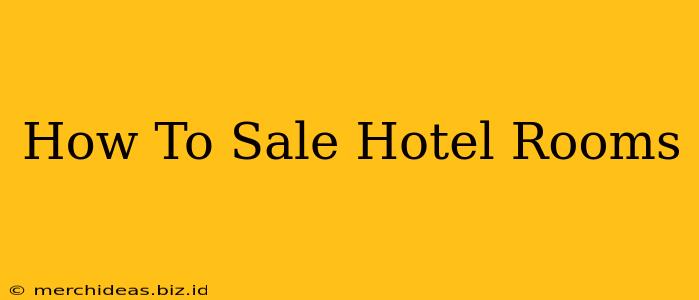The hospitality industry is competitive. To thrive, you need a robust strategy for selling hotel rooms. This guide outlines effective strategies to boost your occupancy rates and maximize revenue. We'll cover everything from understanding your target market to leveraging digital marketing techniques.
Understanding Your Target Audience: The Foundation of Successful Hotel Sales
Before you can sell hotel rooms effectively, you need to know who you're selling to. Identifying your ideal guest is crucial. Consider these factors:
- Demographics: Age, income, occupation, family status, etc. Are you targeting business travelers, leisure travelers, families, or couples?
- Psychographics: Lifestyle, values, interests, travel preferences. What motivates them to choose a hotel? What are their priorities (luxury, budget, location, amenities)?
- Travel Patterns: When do they typically travel? How long are their stays? How do they book their accommodations (online, through travel agents, directly)?
By understanding your target audience, you can tailor your marketing messages and offerings to resonate with their needs and preferences.
Optimizing Your Online Presence: The Digital Hotel Sales Landscape
In today's digital age, a strong online presence is non-negotiable. Here's how to leverage digital marketing to sell more hotel rooms:
1. Search Engine Optimization (SEO): Get Found Online
SEO is crucial for attracting organic traffic to your website. This involves optimizing your website content and structure to rank higher in search engine results pages (SERPs) for relevant keywords like "hotels near [city]", "[city] hotel deals," or "best [type of hotel] in [city]".
- Keyword Research: Identify the keywords your target audience uses when searching for hotels. Use tools like Google Keyword Planner, Ahrefs, or SEMrush.
- On-Page Optimization: Optimize your website content, meta descriptions, and image alt text with relevant keywords.
- Off-Page Optimization: Build high-quality backlinks from reputable websites to increase your website's authority and search engine ranking.
2. Pay-Per-Click (PPC) Advertising: Drive Targeted Traffic
PPC advertising, such as Google Ads, allows you to target specific demographics and keywords to reach potential guests actively searching for hotels. Well-crafted ad campaigns can significantly increase your website traffic and bookings.
3. Social Media Marketing: Engage Your Audience
Social media platforms like Facebook, Instagram, and Twitter are powerful tools for engaging with your target audience, showcasing your hotel's amenities, and running targeted advertising campaigns. High-quality photos and videos are essential for attracting attention.
4. Email Marketing: Nurture Leads and Drive Repeat Bookings
Build an email list by offering incentives like discounts or exclusive offers. Regular email newsletters can keep your hotel top-of-mind and encourage repeat bookings. Segment your email list to tailor your messages to specific audience segments.
Enhancing Your Hotel's Appeal: Beyond the Digital Landscape
While digital marketing is essential, the experience your guests have at your hotel is equally important for driving repeat bookings and positive word-of-mouth referrals.
- Exceptional Customer Service: Train your staff to provide outstanding customer service. Happy guests are more likely to recommend your hotel to others.
- Unique Selling Proposition (USP): What makes your hotel stand out from the competition? Highlight your USP in your marketing materials and on your website.
- Competitive Pricing: Monitor your competitors' pricing and adjust your rates accordingly. Consider offering special deals and packages to attract more guests.
- Amenities and Services: Offer attractive amenities and services to enhance the guest experience, such as free Wi-Fi, a swimming pool, a fitness center, or on-site dining.
Analyzing Your Results and Adapting Your Strategy
Regularly track your key performance indicators (KPIs), such as occupancy rates, revenue per available room (RevPAR), and website traffic. Analyze your results to identify what's working and what's not, and adjust your strategy accordingly. Continuously adapt your approach based on market trends and guest feedback.
By implementing these strategies and consistently monitoring your performance, you can significantly increase your hotel's occupancy rates and achieve greater success in the competitive hospitality industry.
